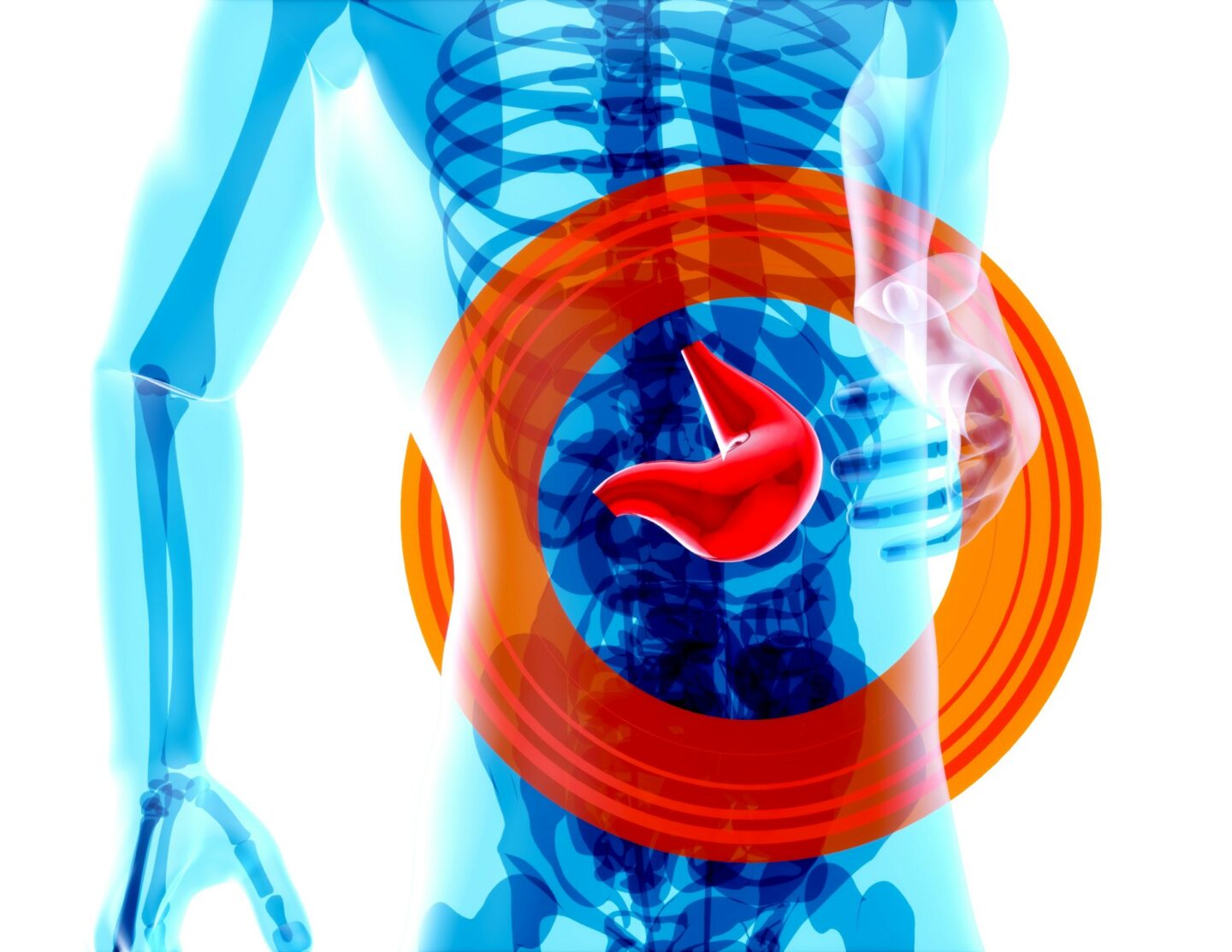
☝️ The most important facts in brief
- A gastroenterologist is a specialist in internal medicine who specialises in the diagnosis and treatment of diseases of the digestive tract.
- Gastroenterologists diagnose and treat gastrointestinal diseases, chronic inflammatory bowel diseases, liver diseases and complaints of the gallbladder and pancreas.
- The procedures frequently used in gastroenterology include colonoscopy, gastroscopy, laparoscopy, sonography and the examination of certain components of blood and stool.
📖 Table of contents
The speciality of gastroenterology includes the treatment of gastrointestinal diseases, liver and pancreatic disorders. To become a gastroenterologist, you must first complete a medical degree and then a six-year specialist training programme. This article is intended to give you a comprehensive overview of the work of a gastroenterologist. We look at typical examinations of the digestive tract, such as colonoscopy, and explain the role of this important specialist.
Are you interested in studying medicine?
We will be happy to advise you free of charge about your options for studying medicine, including advice on studying medicine in another EU country, which is fully recognised in Germany.
A gastroenterologist is a specialist in diseases of the gastrointestinal tract
Gastroenterology is a branch of internal medicine. It deals in particular with diseases of the gastrointestinal tract, but also considers the neighbouring organs.
One focus of the specialists' work is prevention. Colonoscopies, for example, enable gastroenterologists to recognise bowel cancer at an early stage so that it can still be easily treated.
As a specialist in gastroenterology, you can work in large clinics, for example. However, you also have the opportunity to set up your own practice or pursue a career in research.
Gastroenterological diagnostics and treatment
Doctors in gastroenterology diagnose and treat diseases of the oesophagus, gastrointestinal tract, liver and pancreas.
A large part of the work involves colonoscopies, as these are offered as part of bowel cancer screening and are also carried out in cases of suspected bowel disease. Medicine has made great progress in the treatment of bowel cancer, which is why cancer in the bowel that is detected early is usually easily curable.
Patients are often referred from internal medicine to gastroenterology, which in turn is also a sub-speciality of internal medicine. Here, they benefit from specialised specialists and treatment tailored to the individual clinical picture. Specialising in the digestive tract enables you as a gastroenterologist to provide people with particularly sound advice and efficient treatment within your area of expertise.
Diagnostics and treatment are not always strictly separated in gastroenterology
The specialist area of gastroenterology has the great advantage that diagnosis and treatment can be carried out in parallel in many cases. For example, gastroenterologists can directly remove suspicious mucosal changes and polyps and cauterise lesions as part of a colonoscopy or an assessment of the duodenal mucosa. For the patient, this means that they do not need another appointment and do not have to undergo any further procedures.
Complaints can often be alleviated efficiently during a visit and illnesses treated as gently as possible. Of course, this is not possible for all problems of the digestive system. However, gastroenterologists always try to treat the disease as gently as possible.
Prevention is an important part of gastroenterology
Prevention plays an even more important role in gastroenterology than in most other specialities. The aim is to ensure that patients do not only consult a doctor with abdominal pain or other problems requiring treatment, but that many gastrointestinal problems are recognised well in advance.
Colonoscopies and other screening examinations can detect many dangerous diseases at a stage when they are not yet causing any symptoms. This is very important because the earlier treatment is started, the better the chances of recovery.
Chronic inflammatory bowel diseases
Another important focus of gastroenterology is the treatment of chronic inflammatory bowel diseases such as Crohn's disease and ulcerative colitis. These diseases require long-term care and regular examinations.
While Crohn's disease can occur anywhere in the gastrointestinal tract, ulcerative colitis is usually limited to the large intestine.
Gastroenterologists work closely with patients to develop individualised treatment plans. Unfortunately, there is no cure for either disease. The aim is therefore to alleviate the symptoms and improve the patient's quality of life.
The gastroenterologist treats more than "just" gastrointestinal diseases
Although the name "gastroenterology" is made up of the words "gastro" for stomach and "enteron" for intestine, this specialist department of internal medicine also deals with the treatment of diseases of the liver, gallbladder, oesophagus and pancreas.
The focus is therefore on the entire digestive tract, including the neighbouring organs. Gastroenterologists therefore require comprehensive knowledge in this area.
Liver
The liver is a central organ and plays an important role in the body's metabolism and detoxification. In gastroenterology, you will encounter various liver diseases such as the different forms of hepatitis, liver cirrhosis and fatty liver.
Liver complaints can manifest themselves in many different ways. These often include abdominal pain and general malaise. Liver cirrhosis mainly occurs as a late consequence of hepatitis and alcohol abuse, but can also have other causes.
Depending on the symptoms and causes of the disease, doctors can treat liver diseases in different ways.
Pancreas
The pancreas is another important digestive organ that produces insulin and digestive enzymes and therefore has an effect on the stomach and intestines.
Diseases such as pancreatitis and pancreatic cancer therefore also fall within the specialism of gastroenterologists, to whom patients are referred by their GP if these diseases are suspected.
As a gastroenterologist, you will ensure that people affected by pancreatic problems receive the best possible diagnosis and treatment. This can include both drug therapies and surgical interventions.
Gallbladder and bile ducts
Diseases of the gallbladder are also a focus of gastroenterology. Problems such as gallstones or inflammation of the gallbladder can cause severe pain and digestive problems.
Gastroenterologists can often diagnose such diseases using ultrasound. Depending on the type and severity of the disease, possible treatments range from drug therapy to surgical interventions.

Becoming a gastroenterologist - the complete training programme
If you are interested in specialising in gastroenterology and would like to work as a specialist in this field, you will be faced with extensive training. This begins with the six-year medical degree programme and then continues with the six-year specialist training programme.
The extensive training ensures that you will later have the necessary specialist knowledge as a doctor in gastroenterology to be able to perform all tasks in the best interests of the patients entrusted to you.
Gastroenterology is a branch of internal medicine, which is why your training will include a lot of content from this field. However, it makes sense that internal medicine is subdivided into different specialisations and that digestive diseases in particular are a separate topic within gastroenterology, as this medical speciality would otherwise be too extensive.
Study of medicine
Just like doctors in all other medical specialities, as a gastroenterologist you must first complete a medical degree. The question "What is a gastroenterologist" can therefore always be answered with "A doctor specialising in the digestive organs". Although the intestines and other digestive organs are definitely a topic here, you are not yet specialising in a specific area.
Instead, during the two-year pre-clinical and four-year clinical programme, you will acquire all the knowledge about the human body and the basics of the various specialist areas. However, you will only focus on gastroenterology after you have passed your state examination and can work as a doctor in a clinic.
Specialist training
While you are working as a registered doctor at a clinic after your studies, you can complete further training to become a specialist in gastroenterology alongside your job. This takes 6 years and ends with you being authorised to use the specialist title "Specialist in Gastroenterology".
During your specialist training, you will learn many details about the health of the gastrointestinal tract and the diagnosis of various diseases. You will learn how to perform a gastroscopy and many other examinations independently. After successfully completing your specialist training, you will be able to work independently as a specialised doctor in gastroenterology.
Salary and career opportunities in gastroenterology
Gastroenterologists earn a comparatively high salary on average in Germany. Specialists in gastrointestinal diseases also have good career opportunities. They can work in clinics, surgeries or research institutions, among others.
The demand for specialists for certain treatments and diagnostic procedures such as colonoscopy and gastroscopy is high. As the average age of the population is increasing, colonoscopy in particular is being performed more frequently as part of preventive care, which of course requires the expertise of a suitably trained specialist.
Free information material
Studying medicine abroad 🎉
Order your info pack now, find out more about the Studying medicine abroad and get started as a medical student!





